Annette Bening Jumped Into ‘Nyad’ Without Thinking
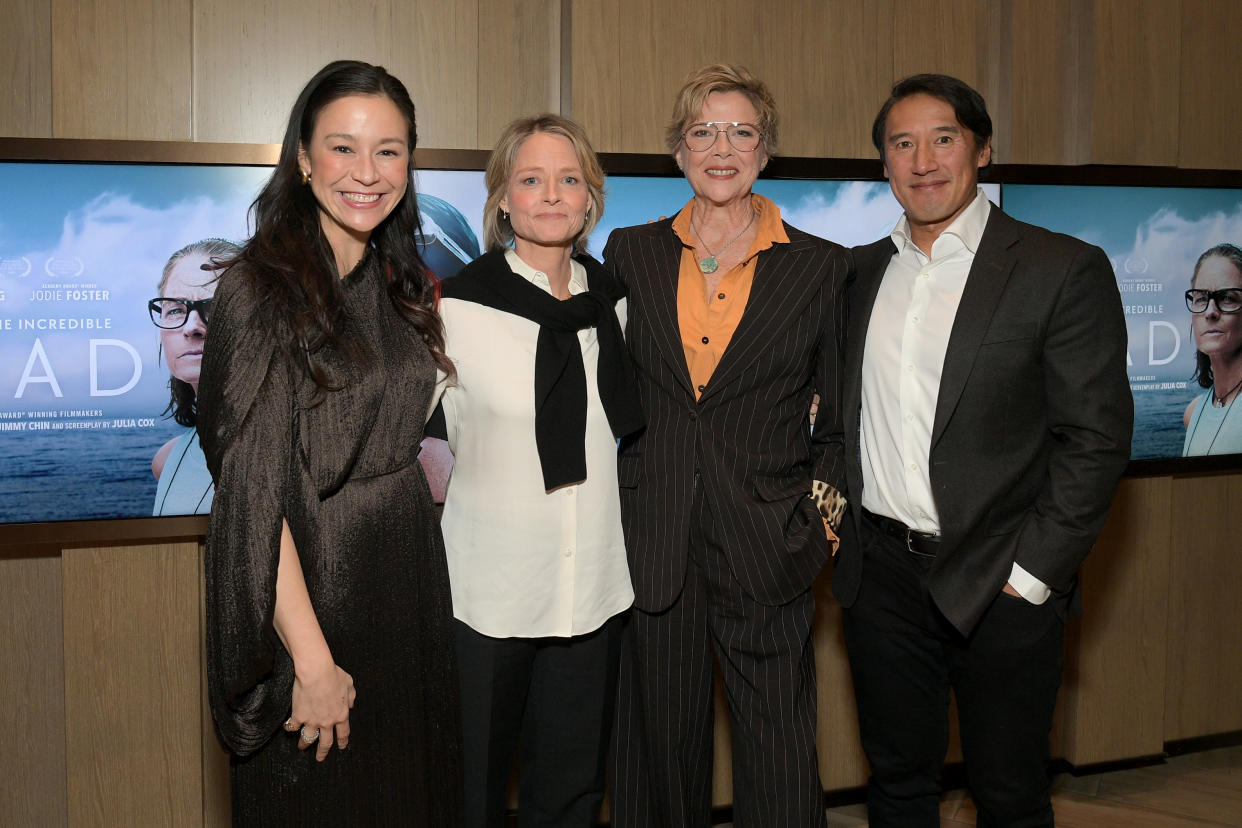
- Oops!Something went wrong.Please try again later.
- Oops!Something went wrong.Please try again later.
When Annette Bening likes a project, she jumps in. That’s what happened with Netflix’s festival hit “Nyad,” based on the story of 60-ish cranky competitive swimmer Diana Nyad and her refusal to abandon her dream. When she signed on to star in Nyad’s story of swimming 110 miles in open ocean from Cuba to Florida, Bening wasn’t thinking about the details of what playing the title character would entail. She just wanted to play the part.
Over the course of her three-decade career, which has yielded four Oscar nominations (“The Kids Are All Right,” “Being Julia,” “American Beauty,” and “The Grifters”), Bening’s dramatic and comedic roles have run the gamut from con artist, Machiavellian schemer, and gangster’s moll to angsty suburban housewife. But she’s never been identified as a physically athletic actress.
More from IndieWire
Tim Curry Will Shake Your Soul in Gleefully Noxious 'Beauty and the Beast: The Enchanted Christmas'
Willem Dafoe Acted Opposite '2,000 Real Rats' for Robert Eggers' 'Nosferatu'
“I’ve always been an athletic person in my personal life,” she said over Zoom. “I’m an exercise person since I was 20.” In “Open Range,” “I ran across the prairie at one point.” On “The Siege,” she remembered “doing a lot of yoga on the set. Back in the day I could do a handstand — against a wall. In ‘Mars Attacks,’ I did float in a pool in the lotus position.”
For “Nyad,” after a year of training, Bening who, at 64, was the same age Nyad was when she completed that marathon swim, could do the freestyle for eight hours a day, and loved being in the water. She told us how she did delivered the performance that landed her a Golden Globe nomination, along with supporting costar Jodie Foster.
The following interview has been edited and condensed for clarity.
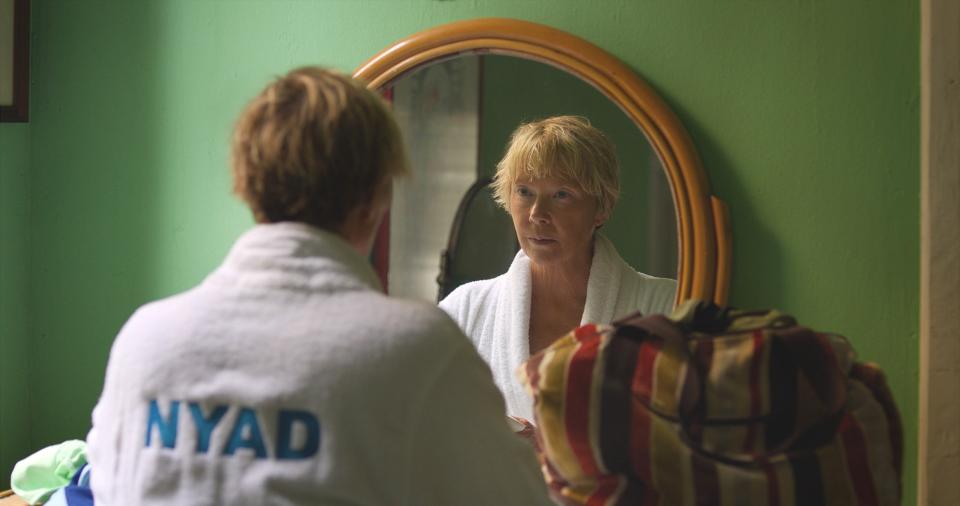
Anne Thompson: Are you wearing your hair shorter now that you’re a professional swimmer?
Annette Bening: I’ve been a short hair person most of my adult life, but I would even be shorter probably except I’m working on a project. So I can’t cut it all the way off. But once I’m done with the project, I might just go even shorter, because then I don’t have to have a hairdresser, which I love. When I go do things, I can just show up, which is freeing.
When this project first came to you, did you realize what playing Nyad would entail?
I’m an impulsive person. And if I respond to material I know immediately most of the time. And I also knew that Jimmy [Chin] and Chai [Vasarhelyi] were directing it. I didn’t know them, but I knew their movies [Oscar-winning doc “Free Solo”]. So when I read it: “I’m doing this. This is just so fucking good. I love this story.” It completely moved me. It captured me and I saw, “Wow, this is a great challenge.” So I said yes. Then, “Oh, wow, wait a minute. Bathing suit. Wait, that’s me in a bathing suit. That’s me swimming. Well, I’m in good shape. I’ll just start swimming.”
And then I started. I got in the pool: “Yeah, I guess I’ve never been a lap swimmer.” I was a diver. I worked on the ocean. I worked on a boat. I’m comfortable jumping in the water, being in the ocean. But I had a moment of, “Oh, my god, I’ve agreed to do this. Wait, how is that going to work? I’m suddenly going to be a swimmer? And how am I going to make that look right?”
How did you get past that?
I had to overcome a lot of fear and “can I do this?” But I’d already decided to do it, which is how I’ve lived most of my life. There’s a lot of reasons not to live life that way. But there’s also reasons to live life that way, because then you end up doing things that if you thought about you would probably never do. I just started going to a trainer. I had a great swim coach, Rada Owen, who was an Olympian. She coaches kids, so she coaches beginners all the time. She still loves to swim. She came over, and I nervously showed her my lame attempt at freestyle. I literally went on YouTube. “Freestyle: how hard can it be?”
I just started swimming, without knowing anything. Because I wanted to do it that way. I showed her what I could do. And, “Oh, yeah, we can make this work.” So she immediately made me feel, “OK, maybe this is actually doable.” Then I set about to train and learn, and she got in the pool with me. I’m great for someone demonstrating. So she was in the water with me showing me.
The first thing that a lot of beginners do and that I certainly did was kicking like hell, because I’ve got strong legs. You can’t do that with the crawl. It’s mostly upper body. Then it’s a question of body coordination, and just learning and trying. I had to figure out the stroke: how important is it that it looks like Diana? Which side am I going to breathe on? Well, Diana used to breathe on her left. And she breathes on every stroke. Also she has to be able to look at the boat. She had great stroke techniques. And she taught me single arm drills that helped me to get my brain in the right place.
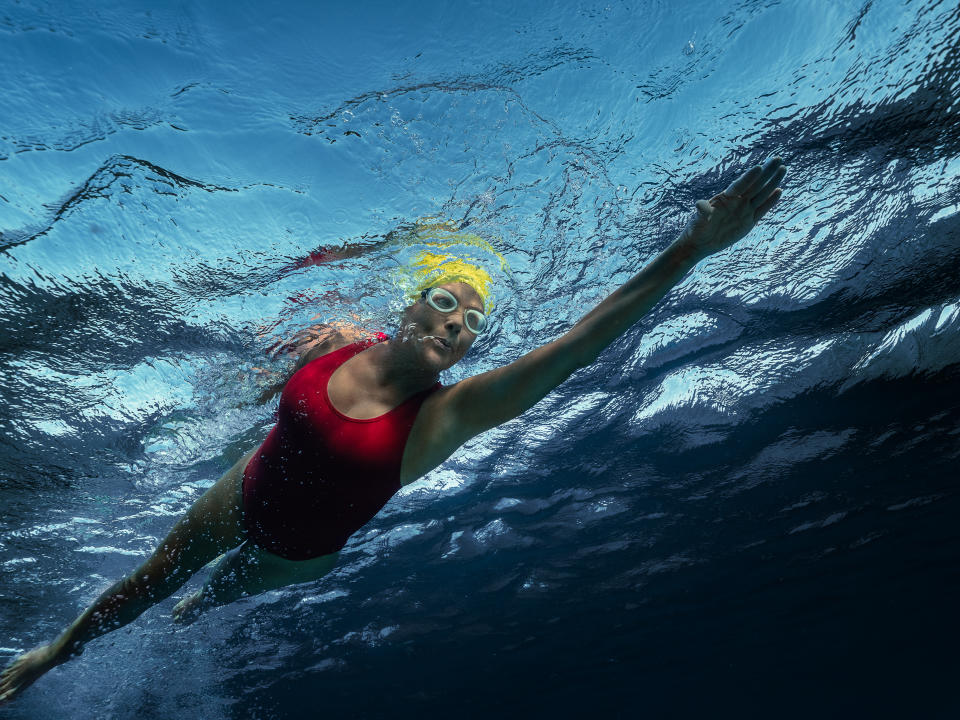
So how many hours a day were you training?
I also had a trainer. So I went to a gym. The guy was great. He’s a friend of Jimmy’s. But it wasn’t my favorite thing. I got to love the water. I’ve always been somebody who loved the water. Afterwards you feel so great. And also it made me sleep. And I often have trouble sleeping. So the benefits were there for me right away that I fell in love with. Plus, I was terrified: “I gotta get this right.” I try not to overtrain, but I would swim at least an hour a day, sometimes more.
Thanks to a production delay, you trained longer?
I did train for at least a year, but it actually might have been longer.
You were in the tank for 30 days? And you were in the water from four to six to eight hours?
Yes, but there’s also breaks, and we do a take and then they have to break for 10 minutes or 15 minutes or longer, and they run and put me in the Jacuzzi. I did swim a lot, and I had long days. But I liked it. I liked being in the water. It didn’t bother me. We were using a ton of sunscreen.
I heard that you calibrated with your body and your stroke where you were in the trajectory of the swim, that you changed it as you went along. That you are basically acting with your whole body.
We needed a stroke that looked like, “This is the stroke where you’re doing pretty good, you’re in good shape, you’re eight hours in, then you’re 10 hours in, then you’re 12, then you’re 15, then you’re 24 hours, and then you’re 30 hours in.” So the way that the script was constructed, it made clear where she was. And there is a point at which all of these marathon swimmers get where they hallucinate, they’re physically and emotionally exhausted, and they keep swimming.
And then you had to deal with the makeup, the prosthetics, adding hours in the makeup chair to your day?
The pressure is then on the prosthetic artist. They did such a good job that people don’t even realize they should be nominated for this — definitely, because they did it in such an artful way that sometimes people think “Oh, yeah, her face looks like it’s all fucked up.” But they don’t get that because the makeup was so specific. And we had different levels of “ravaged face,” and they worked it out.
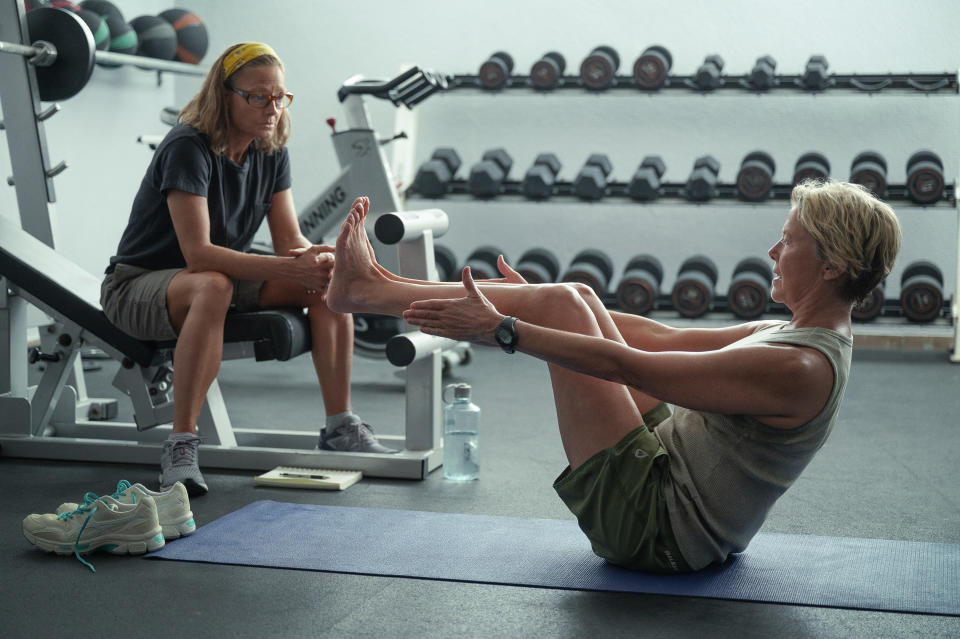
Didn’t the makeup make it difficult for you to breathe in the water?
The prosthetics didn’t make it difficult to breathe. Diana had to figure out a mask and a body suit for the jellyfish because she went one of the swims and was stung by box jellyfish, which is deadly. What did Diana do? She found the box jellyfish expert, and got that woman to design the suit for her that she could wear. So she had a mask over her whole face. You can’t see it in the movie, but there’s a denture inside the facemask, because [jellyfish] can go in your mouth.
Diana would literally close her mouth when she put her mouth in the water. Usually, you exhale in the water, right? And then inhale when you come up. But she would actually inhale and exhale with her head up while she had the mask on. And that was all night. It’s crazy. So literally, when she had that thing on, she would keep her mouth closed with the little denture plate inside the mask.
Obviously you’re making a movie, you can always just say, “Sorry, cut. I’m dying over here!”
It’s not how people were describing you. I understand Jodie Foster would stand on the side of the boat, jumping up and down with anxiety that you’d been in the water for so long and asking if you are all right.
She did. She did do that. Listen. This was a great privilege. Yes, it was hard physically. OK, but it’s a movie. Yes, it was trying. And it asked a lot of me and all that. But I loved that. And a lot of people and a lot of women of a certain age are dying for a big challenge. It’s a great thing in life. And I feel lucky that I got to do that. And so yes, it was hard, but I loved it.
Part of what you and Jodie and the directors and the screenwriter Julia Cox had to figure out was, how cranky was Diana going to be? You go for it. You show her warts and all. But that’s a calibrated decision; you can’t go too far or you lose the audience.
Well, it’s a risk the entire time. Just like every creative endeavor you’re doing. You’re living in uncertainty. “Is this it? Is this not? Shall I try that? How far should I go?” I certainly knew that I needed to give her an arc from a narrative point of view. And Diana gave us some leeway.
Is Diana a difficult personality sometimes? Absolutely. Is she incredibly eccentric, and like nobody else that you’ve ever met? For sure. She is a force of nature. So I needed that to be the case. And I wanted that. But of course, I also, because I got to know her very well, and she began to trust me, I also knew that there was this vulnerable, interesting, complicated hurt person who had been raised in a way that was quite difficult.
Under difficult circumstances that she had no control over, including what happened to her as a teenager being abused by her swim coach. I wanted to find all of the colors if I could. So all I tried to help craft the script to give it that arc, and then to live in that uncertainty. Just like our expectations of women politicians, women in positions of power, do they have a different metric than men in terms of the words used? Right? “Do I like her? And do I feel sympathetic to this person?” And what great athlete doesn’t, they have a way of speaking that can be over the top. They have to think that way.
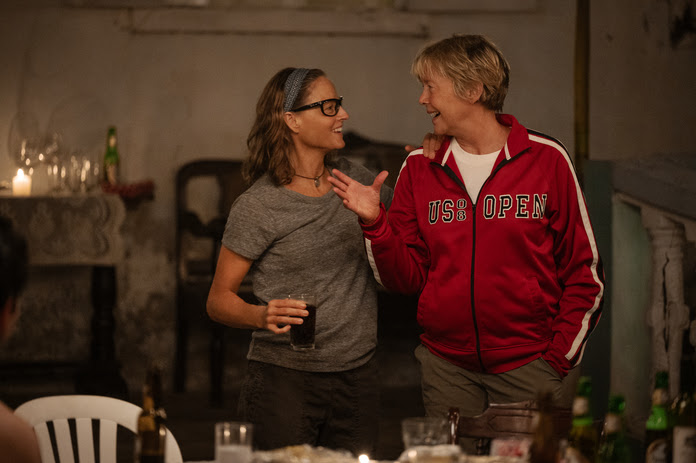
We’re talking about someone who exhibited heroic behavior, right? It’s extraordinary what she did.
Yeah, force of will. But also what I love about her story is that she cared enough about her own life. She had to fight for that inner feeling. She had to fight for “what I do with this life that I’m given, that matters. Fuck it, I am going to risk everything. And I matter.” And that feeling that she had to earn, that she mattered, is something that we can all relate to. You’re given this existence. How much is our choice? How much is what happens to us? I’m touched by Diana, because she had to earn the right to say, “OK, I matter enough to do this thing.” And drive a lot of people crazy doing it.
Were you sure Jodie Foster would sign on? You met with her in New York?
They were asking her to do it. I thought, “The chances are pretty slim she’s going to do this. Because she could play Diana.” And I didn’t know her. And she’s a great actress. So then they said, “She’s interested.” And I said, “Great.” She came to meet me in LA. And I could tell she was, “OK, what’s she like? What’s this going to be like?” And I immediately said to her, “Look, say everything you want to say.” Because she has a lot of ideas. She’s incredibly smart. She’s made so many movies, she’s directed, she writes, she does everything. And she’s been in the business for 57 years. So I said, “I completely love your ideas and go for it.” She was saying, “This is is going to be hard and the logistics and the scheduling, and we need to work on the script, it’s too long, and this needs to be different.”
She had fabulous, smart ideas. We just got on. Then at that meeting in New York, I was thanking her because I knew that if she did the movie, it would make the movie. Why? Because she understands story. And because she is humble. She also knew Diana and [her coach] Bonnie before. I did not know that until I talked to her. I knew that she would make the movie better.
You’re only as good as your scene partner. And acting is reacting, acting is listening, acting is receiving. And when you have utter confidence in the person you’re with and you can be real with them, then maybe you have a chance at something more being communicated.
When you were emotionally drained and it was tough, how you did you get through?
If you’re working at your best and your hardest, there are times. We didn’t work on weekends. I did nothing else. So I was prepping for the next day and thinking about the next day and going to the next day. Saturdays, I remember being completely wiped out. It’s part of the job. There are times I think, “I can’t do any more emoting. I’ve done too much.”
I’m sorry that you had to miss the festivals, to be with everyone else. I know everybody was fighting for a good cause. Now you’re getting to hear what audiences think. Have you gotten some response from people?
I’ve gotten a lot of response. And I’ve also gotten response not just from women, and not just from women over 60, or whatever that is. I love the movie. And I love the story. And a great sports story is a universal thing. We love to tell the stories of the security guard who was in the back and watching the movie, and he’s getting choked up at the end. It’s a universal thing, right? Because it’s the individual. And certainly in this sport, it’s an individual sport.
So it’s the individual, forging on in life, as we all are, we’re all like the solo people. But we’re highly dependent on everyone around us to survive. So it’s a great metaphor in that way. It doesn’t mean you have to be a woman, and doesn’t mean you have to be a woman over 60 to say, “Oh, wow, I have a thing I want to do, whatever that is.” Of course there are much more serious issues that people are struggling with in life. God knows, illness for one, if somebody is struggling with how to navigate being ill. How do we do those things? Well, we do them by getting other people to help us. That’s how we always do everything. And this is the story that Diana is living.
Next up: Bening is in the middle of shooting a limited series in Australia, “Apples Never Fall.” “We were shooting in the middle of the writers’ strike,” she said. “We kept shooting because our beloved showrunner could continue to produce but she couldn’t be on the set with us. And then of course, we had to stop when the actors went out. So we’re about to go back to Australia and finish.”
“Nyad” is now streaming on Netflix.
Best of IndieWire
2023 Emmy Predictions: Who Will Win at the Primetime Emmy Awards?
2023 Emmy Predictions: Outstanding Documentary or Nonfiction Special
2023 Emmy Predictions: Outstanding Documentary or Nonfiction Series
Sign up for Indiewire's Newsletter. For the latest news, follow us on Facebook, Twitter, and Instagram.

